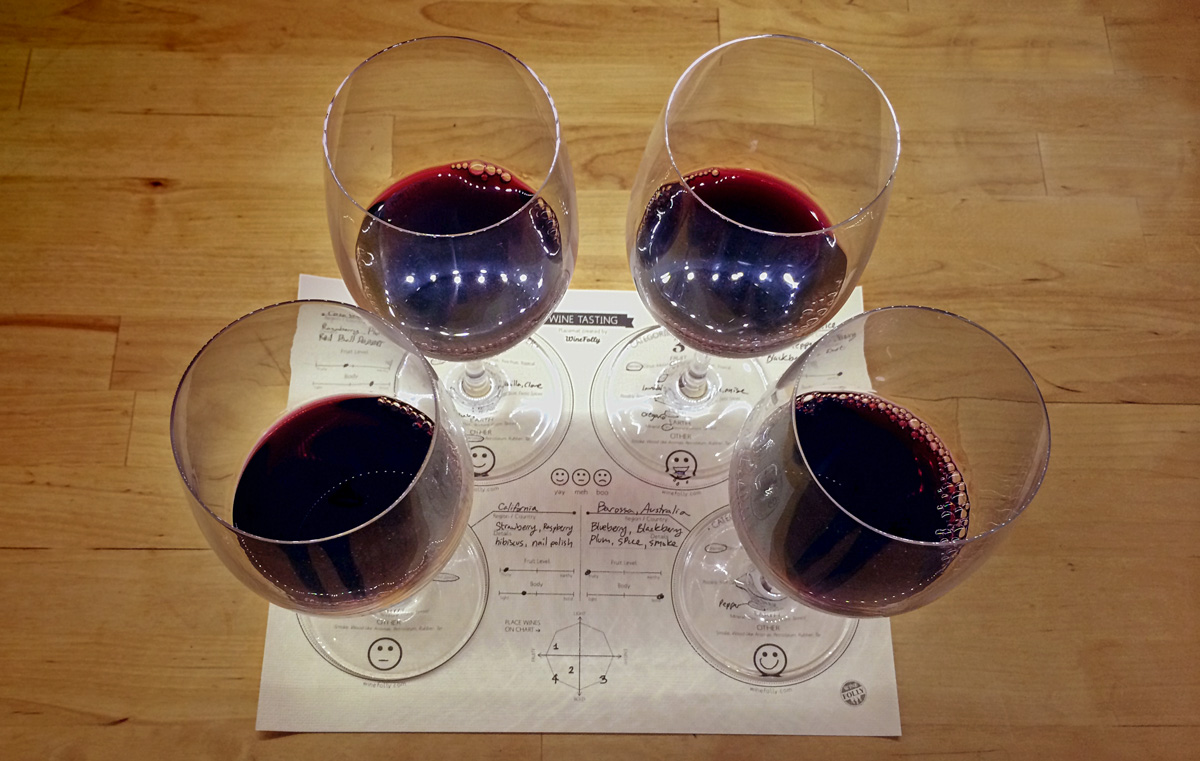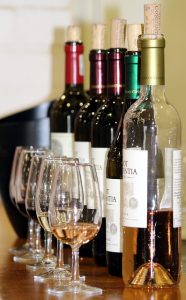 If you’re new to wine tasting, everything may be unfamiliar, at first. If even the basics, such as, what is a wine flight, are on your mind, well, let’s get that one off your list – no one wants to walk into a tasting room screaming “newbie!” (You can also check out the category, “Wine Education” for some other useful tips for newcomers.)
If you’re new to wine tasting, everything may be unfamiliar, at first. If even the basics, such as, what is a wine flight, are on your mind, well, let’s get that one off your list – no one wants to walk into a tasting room screaming “newbie!” (You can also check out the category, “Wine Education” for some other useful tips for newcomers.)
What is a wine flight?
Simply, a wine flight is a grouping of wines. Yep, that’s it! What’s clear is, using the word “flight” for a grouping of wines is arbitrary. What’s not clear is, how did it come into such common use?
The term wine flight is generally thought to have originated from wine competitions. Groups of wine being judged are commonly referred to as flights. Why flights and not other words for “a group of…”? (Here’s a fun list of names for animal groups . Maybe a gaggle, swarm or murder of wine would sound more appropriate? The only reference I’ve found is an anecdote in the comments for this article. The story goes, some judges at a wine competition were discussing the retail price expectations for a grouping of expensive wines. They described the valuation as a “flight of fancy,” which became a “flight of fancy wines,” and, now “wine flight” is in common use.
Some common types of wine flights
The term really does just mean, a grouping. Beyond that, when you ask “what is a wine flight,” most anything goes! The grouping can be structured around a theme (a flight of whites) or arbitrary (“pick five wines to sample from this list”). In terms of volume, it can mean samples (typically a 1 oz pour) to full glasses! (Not to dash your dreams, but a full glass in the wine world is a 4 to 5 oz pour – each bottle pours about 4 glasses.)
There are some special types of flights worth noting: “vertical flight” and “horizontal flight”. These very specific type of flight are for serious wine geeks!
Vertical flight.
A vertical flight samples a winery’s particular wine, from various years. (It’s usually a single varietal, like a Cabernet Sauvignon, but we’ve also seen some blends presented as a vertical flight. Why “vertical’? I think of it as “stacking” the years, one on top of the other.)
You’ll generally get the current release to compare to 4 or 5 prior years’ releases from the “library.” (A winery’s “library” just refers to prior vintages which it’s cellaring. Keeping prior years’ wines on hand is a common practice, for a number of reasons. Very good vintages will gain a reputation among serious wine connoisseurs, and go up in value far beyond the cost of holding them. Additionally, it’s a good quality control check to know how a vineyard’s production is tasting over time.)
Horizontal flight.
A horizontal flight covers the same varietal from the same year, but from different vineyards the winery uses in the region. (Maybe there are other variations, but this is the horizontal flight we’ve experienced.)
If you love wine, vertical and horizontal tastings are both excellent wine education opportunities. In a vertical tasting, you get to experience the effects of weather (mostly). Horizontal tastings emphasize the impact of the topography and the terroir (the soil).
Wine flights in a tasting room environment.
Now, let’s talk about what is a wine flight in the context of wine tasting (a subject near and dear to me! 🙂 ) The term is often used in tasting rooms, where it means, the wines included in the tasting fee. Some wineries use the term, tasting menu, instead – it means the same thing.
How does it work? Generally, a winery will have a standard list of wines which are opened and poured every day. Many wineries offer more than one wine tasting experience, often at different price points. For instance, a winery with both widely distributed and limited production wines might have two (or more) groupings, or flights. A tasting of the widely distributed wines (usually with a lower price point) might be called the standard wine flight and be priced at say, $10 to $20. A tasting of the more limited production wines might be called a reserve flight, and will typically have a higher price tag. To avoid surprises, do make sure you understand what is being offered and what you’re ordering!
There are some variations to what is “typical” for a wine flight (of course!). Our favorite – some wineries let you choose! They set a price for a certain number of tastes, and you pick which wines you’d like to sample. (In these tasting rooms, the full list of wines might be called the tasting menu, and the wine flight will be your selections). Wine tasting tip: If you’re a twosome, each purchasing a tasting flight, you can often cover the whole tasting menu by sharing!
Wine tasting tips – get a wine passport, if you can!
Did I whet your appetite for wine tasting? One of our favorite insider tips for wine touring is to check out wine passports for your ventures. With a wine passport, you save money on tastings, which means more money to buy the wines you love! (If you’re not familiar with the concept, you’ll want to check out our previous posts, What’s a Wine Passport, and, Confused About Wine Passports !) If you’re traveling in California, Washington and Oregon, our passport of choice is Priority Wine Pass, check it out!
Save $20 Instantly on Priority Wine Pass – only $49!
